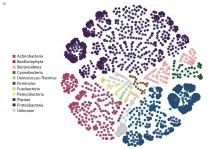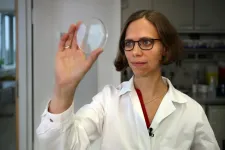(Press-News.org) Building upon previous research, an international team led by scientists at University of California San Diego School of Medicine, has validated a more inclusive and comprehensive genetic tool for predicting age of onset of aggressive prostate cancer, a disease that killed more than 33,000 American men in 2020.
Reporting in the February 23, 2021 online edition of Nature Communications, the researchers describe the performance of a polygenic hazard score (PHS) -- a mathematical estimate of an individuals' age-specific genetic risk for developing a disease -- in a multi-ethnic patient population.
"Genetic tools to predict a man's lifetime risk of prostate cancer might allow us to target cancer screening efforts to the men who are most likely to need it. We are addressing a major public health problem and simultaneously addressing a concern that genomics and genetic tests may exacerbate health disparities because people of non-European ancestry are severely under-represented in most studies," said principal investigator Tyler Seibert, MD, PhD, assistant professor at UC San Diego School of Medicine and radiation oncologist at Moores Cancer Center at UC San Diego Health.
The genetic score developed at UC San Diego was tested in a multi-ethnic dataset of 80,491 men and was shown to be associated with age of onset of prostate cancer, as well as with age at death from prostate cancer. The PHS demonstrated excellent performance in men of European, Asian and African genetic ancestry, said the authors.
However, according to Seibert, there was a prominent gap between men of African versus European ancestry. Most likely, he said, because men of African ancestry were not included in the development of the genetic tool.
In a study published in the International Journal of Cancer in 2020, Seibert and a team of researchers, including Roshan Karunamuni, PhD, assistant project scientist at UC San Diego School of Medicine, identified genetic markers for prostate cancer risk that may be specifically useful in men of African ancestry.
The addition of these new genetic markers to the PHS led to improved performance in identifying men of African ancestry at highest risk of prostate cancer and made the results more comparable to those of the other ancestry groups, said Minh-Phuong Huynh-Le, MD, who is first author of the Nature Communications paper and was a resident physician at UC San Diego Health during the study. Huynh-Le is now an assistant professor at George Washington University School of Medicine and Health Sciences.
"With only a blood or saliva sample, a man's genetic risk of prostate cancer can be estimated," said Huynh-Le. "Prostate cancer screening may reduce morbidity and mortality, but it should be targeted and personalized. Those at higher genetic risk might benefit from earlier and/or more frequent prostate cancer screening, and this genetic tool could identify those individuals."
While the PHS has improved risk stratification, more needs to be done, said Seibert. Much of the data currently used for research continues to lack diverse representation. Even in the data for this study, researchers noted that most men of African genetic ancestry were missing clinical diagnosis information used to determine disease aggressiveness.
"This is particularly concerning, as race and ethnicity play an important part in prostate cancer risk. It is critical that we make sure these tools are designed to perform well in men of all ethnic and racial backgrounds," said Seibert. "These two papers are important steps toward that goal."
INFORMATION:
For list of all co-authors, funding and disclosures please see published paper.
MINNEAPOLIS/ST.PAUL (02/23/2021) -- University of Minnesota Medical School researchers have developed two new rapid diagnostic tests for COVID-19 - one to detect COVID-19 variants and one to help differentiate with other illnesses that have COVID-19-like symptoms. The findings were recently published in the journal Bioengineering.
Although many people are hopeful about COVID-19 vaccines, widespread vaccine distribution isn't predicted to be available until several months from now. Until that happens, the ability to diagnose COVID-19 quickly and accurately is crucial to help minimize loss of life and ...
Shipping traffic can be a major source of tiny plastic particles floating in the sea, especially out in the open ocean. In a paper published in the scientific journal Environmental Science & Technology, a team of German environmental geochemists based at the University of Oldenburg's Institute of Chemistry and Biology of the Marine Environment and led by Dr Barbara Scholz-Boettcher for the first time provides an overview of microplastics mass distribution in the North Sea.
The scientists found that most of the plastic particles in water samples taken from the German Bight, an area in the south-eastern corner of the North Sea which encompasses some of the world's busiest shipping lanes, originate from binders used in marine paints. "Our hypothesis is that ships leave ...
A recommendation for more intensive blood pressure management from an influential global nonprofit that publishes clinical practice guidelines in kidney disease could, if followed, benefit nearly 25 million Americans, according to an analysis led by researchers at the Johns Hopkins Bloomberg School of Public Health.
The new recommendation from Kidney Disease: Improving Global Outcomes, a global nonprofit that develops evidence-based clinical practice guidelines in kidney disease, is aimed at doctors to help them to reduce blood pressure for chronic kidney disease patients whose systolic blood pressure levels are over 120 mmHg. Blood pressure can be reduced using antihypertensive medications and lifestyle modifications. ...
Multi-ethnic neighborhoods in England retain their diversity and are much more stable than such neighborhoods in the U.S., according to geographers from the U.S. and U.K. The team examined how neighborhood diversity has changed on a national scale from 1991 to 2011 using U.K. Census data.
Past studies of this kind have often focused on neighborhoods in which the presence of two or three different ethnic groups constituted a diverse neighborhood but this study applied a more rigorous standard. A multi-ethnic neighborhood had to have at least five or more ethnic groups represented and no group could represent more ...
The cocktail of beneficial bacteria passed from mother to infant through breast milk changes significantly over time and could act like a daily booster shot for infant immunity and metabolism. The research, conducted by scientists from Montreal and Guatemala and published in Frontiers in Microbiology, has important implications for infant development and health.
Researchers discovered a range of microbiome species never before identified in human milk. Until now, relatively little was known about the role microbiome bacteria play in breast milk. These bacteria are thought to protect the infant gastrointestinal tract and improve aspects of long-term health, such as allergy ...
A toxin produced by bacteria as a defence mechanism causes mutations in target bacteria that could help them survive, according to a study published today in eLife.
The finding suggests that competitive encounters between bacterial cells could have profound consequences on the evolution of bacterial populations.
When bacterial cells come into contact, they often produce toxins as a defence mechanism. Although it is known that the bacteria producing these toxins have a competitive advantage, exactly how the toxins affect the recipient cells is less clear.
"Undergoing intoxication is not always detrimental for cells - there are scenarios in which encountering a toxin could provide a benefit, such as generating antibiotic ...
To combat climate change, shifting from fossil fuels to clean and sustainable energy sources is imperative. A popular candidate in this regard is hydrogen, an eco-friendly fuel that produces only water when used. However, the efficient methods of hydrogen production are usually not eco-friendly. The eco-friendly alternative of splitting water with sunlight to produce hydrogen is inefficient and suffers from low stability of the photocatalyst (material that facilitates chemical reactions by absorbing light). How does one address the issue of developing a stable and efficient photocatalyst?
In a study recently published in Applied Catalysis B: Environmental, ...
Having a memory of past events enables us to take smarter decisions about the future. Researchers at the Max-Planck Institute for Dynamics and Self-Organization (MPI-DS) and the Technical University of Munich (TUM) have now identified how the slime mold Physarum polycephalum saves memories - although it has no nervous system.
The ability to store and recover information gives an organism a clear advantage when searching for food or avoiding harmful environments. Traditionally it has been attributed to organisms that have a nervous system.
A new study authored by Mirna Kramar (MPI-DS) and Prof. Karen Alim (TUM and MPI-DS) challenges this view by uncovering the surprising abilities of a highly dynamic, single-celled organism to store and ...
During ice ages, the global mean sea level falls because large amounts sea water are stored in the form of huge continental glaciers. Until now, mathematical models of the last ice age could not reconcile the height of the sea level and the thickness of the glacier masses: the so-called Missing Ice Problem. With new calculations that take into account crustal, gravitational and rotational perturbation of the solid Earth, an international team of climate researchers has succeeded in resolving the discrepancy, among them Dr. Paolo Stocchi from the Royal Netherlands Institute for Sea Research (NIOZ). The study, now published in the ...
During this unique study, a team of researchers led by Professor Jane Ogden from the University of Surrey investigated the impact of actively preparing or watching others prepare food (e.g., on a cooking show) versus distraction away from this focus. Researchers sought to understand how this may affect the amount of food consumed and influence the desire to continue eating.
To investigate this further, eighty female participants were recruited and assigned to one of four groups: active food preparation (preparing a cheese wrap within 10 minutes), video food preparation (watching a video of a researcher preparing a cheese wrap), distraction ...



